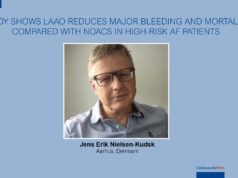
According to a press release, one-year total population clinical outcome data from e-ULTIMASTER—the world’s largest registry of patients treated with a drug-eluting stent—can reinforce “the trust cardiologists worldwide have in the Ultimaster drug-eluting stent (Terumo)” while providing valuable insight into treating a range of high-risk patients. e-ULTIMASTER is a global real-word registry of over 37,000 patients from 378 hospitals across four continents.
At PCR e-Course, one-year clinical outcomes of the total population were reported—together with subanalyses for geographic particularities and of three prespecified high-risk subsets (bifurcation, multivessel disease and complex percutaneous coronary intervention). The data were presented by Marco Roffi (University Hospital of Geneva, Geneva, Switzerland), Mamas Mamas (Keele University, Keele UK), Bernard Chevalier (Institut Cardiovasculaire Paris-Sud, Paris, France), and David Hildick-Smith, (Nuffield Health, UK) during a late-breaking clinical trial session at PCR eCourse 2020.
Marco Roffi (University Hospital of Geneva, Geneva, Switzerland) says: “The study outcome was excellent. The primary endpoint was target lesion failure defined as a composite of cardiac death, target vessel related myocardial infarction and clinically driven target lesion revascularisation at one year. This was less than 5% across all study sites. The second important point is that the rate of definite or probable stent thrombosis at one year was below 1%.”
Mamas notes: “We know that randomised controlled trials are recruiting more selective cohorts. Registries recruit real-world populations; the sort of patients we see in everyday practice. They are important because they capture a much wider geographical spread than many randomised controlled trials are able to and they also include many patients with comorbidities who are otherwise excluded.”
Toshi Osada, president of Terumo, states: “The e-ULTIMASTER registry, with over 37,000 patients, is until today the largest real-life global PCI registry with contemporary stents and highlights our commitment to interventional cardiology and clinical research. This registry enables physicians to explore outcomes and identify best treatment options for patients with complex pathology and anatomy and adds power to the available and growing body of clinical evidence about bioresorbable polymers and Ultimaster drug-eluting stent.”













